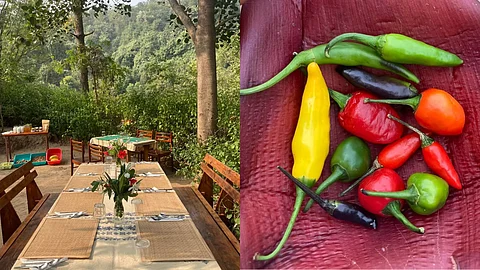
- HOMEGROWN WORLD
- #HGCREATORS
- #HGEXPLORE
- #HGVOICES
- #HGSHOP
- CAREERS
- ABOUT US
- CONTACT US

A regenerative agro-forest in the vast wilderness of the Western Ghats. A coffee plantation cultivating a rare variety of wild Arabica that is virtually extinct in Africa. A sanctuary for indigenous flora and fauna. The Gorus Forest Farm — perched on a small hill in the Western Ghats mountain range in Nanegaon, about 50 km west of Pune, Maharashtra — is all of these at once.
Founded by organic farmer, ecologist, and water researcher Ashwin Paranjpe in 2008 with 10 acres of uncultivated land on a small hill in the Western Ghats, the farm has grown into a paradise for birdwatchers, artists, and nature enthusiasts over the last seventeen years. Today, it is a sanctuary for birds, animals, and native plants alike. Birds like Coppersmith Barbet, Crested Serpent Eagle, and Golden Oriole; and animals such as Barking Deer, Mouse Deer, Porcupine, Pangolin, Palm Civet, Wild Pig, Striped Hyena, and Hanuman Langur can be spotted at Gorus during dusk or dawn.
Wof Zerash, a rare variety of wild Arabica coffee, is the main crop which is grown under the shade of native trees like Arjuna, Asana, Beheda, Khair, Jamun, Mango, Mahua, and Sirish at Gorus. Spices and aromatics like turmeric, ginger, mango-ginger, black pepper, tapioca, and pineapple are grown as intercrops. The farm is also home to a wide variety of fruit crops like mango, cashew, mangosteen, rambutan, avocado, mulberry, star fruit, chikoo, banana, jamun, and jackfruit, while grasses like lemongrass, vetiver, and citronella are planted across hill-slopes for controlling soil erosion.
Committed to the ethos of sustainability, environmentalism, and regenerative agro-forestry, the Farm is entirely reliant on renewable and solar energy. Fallen branches from the forest floor, and dung-cakes from the livestock are used for fuel in the traditional 'chulha' ovens used for cooking. Dung from the livestock animals are also used as manure to cultivate vegetables like cucumber, pumpkin, cherry tomatoes, mint, garlic, lettuce, kale, and several varieties of chillies for consumption of Paranjpe's family, guests, as well as the farm staff.
The water used at Gorus is also sourced locally from the Walki river and a deep bore-well. Two ponds within the farm store a total of 5,00,000 litres of water on a stock-and-flow basis, and irrigation is provided once per week through sprinklers. Contour trenches, a check-dam, and a bore-well recharge pit aide in rainwater percolation, and waste-water is recycled using root-zone technique.
And the best part? You can stay at Gorus and experience all this firsthand. There are three cottages within the farm premises that can be booked for both short and long stays. Guests can participate in daily farm activities at Gorus, or go on guided tours to the Besde Buddhist Caves, Kuperi Peak, Jambhuldev Sacred Grove, Walen Shiva Temple, and Tikona Fort. Paranjpe also hosts coffee tours, workshops, and pop-up food events focusing on farm-grown ingredients and local recipes at the farm. A farm fair is organised every year in February.
If you enjoyed reading this, here's more from Homegrown:
Head To These Permaculture Farmstays Across India For An Eco-Friendly Holiday
Could This Regenerative Kerala Homestead Signal A Truly Sustainable Off-The-Grid Future?
Visit A Kerala Farmstay Encouraging Slow Living Amidst A Rewilded Tropical Forest
